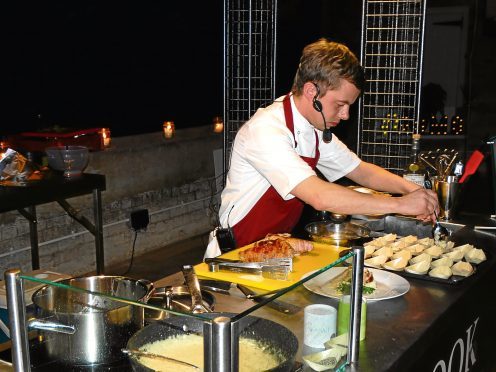Just sometimes nature and the human world collide – quite literally.
I’m thinking of birds that mistake windows for open spaces and fly headlong into them with fatal consequences. Four times in my life I have knocked down a roe deer that has risen from a verge side and, as if fulfilling an apparent death wish, has started across the road in front of the car when there has been no time to take evasive action.
Last weekend a swan flew into overhead power lines, plunging the village of Fettercairn into Stygian gloom. Until there is a blackout we hardly think how dependent we are on electricity.
It took Benjamin Franklin standing, drenched, in a violent lightning storm and flying a kite with a metal key hanging from it, to discover that electricity is a form of natural energy that could be harnessed for us humans’ benefit. I got to thinking how it must have been for our ancestors before Ben stood in the bucketing rain in his spirit of selfless research. It couldn’t have been too good for Ben, either – Wellington probably hadn’t yet invented his boots nor Mackintosh his waterproof coat.
While the television screen remained blank and engineers were shinning up electricity poles and dangling at great height to sort the problem, the Doyenne and I resorted to talking to each other – amazing what you can get up to in the dark. She got out candlesticks and candles and we chased Inka off to his bed, as we were in danger of tripping over him in the poor light.
It must be difficult for families in all-electric houses in these situations. Having lived most of our married life in remote locations, we have always been aware of the need for backups in the event of power failures. Modern technology means these events are less frequent but we can boil a pan of water for a cup of tea or to fill a hot water bottle on the Calor gas cooker. We no longer have an open fire so we bought a gas heater as backup if the central heating is off for long periods.
Goose fever
There’s more goose activity this year than I remember for some years. Not surprising, as the bird counts at Montrose Basin – one of Scotland’s most important migrant destinations – show that by October a record 90,000 pinkfoot geese had arrived there to overwinter in the UK.
Most mornings, out with Inka for the early walk, I’m seeing and hearing skeins of the birds passing overhead. Geese have favourite feeding areas but will range over large distances in their search of food.
From field to fork
Gamekeepers dressed in their estate tweeds and their clumpy working boots, acting as waiters, handing round trays of delicious cooked food, was not what the Doyenne and I had expected when we accepted an invitation to the Game from the Glen celebration held by the Angus Glens Moorland Group at Rottal Steading, near the head of Glen Clova.
The purpose of the evening, coinciding with Great British Game Week, was to raise awareness among restaurateurs, hoteliers and butchers of the food value and benefits of wild game such as venison, grouse, pheasant partridge and rabbit.
From personal experience, we know how delicious wild game is. The Doyenne maintains that game birds are as simple to cook as supermarket chicken, and infinitely tastier. It is healthy meat, virtually fat free, which has been bred and raised in a natural, free-range environment. Nothing goes to waste – when the meat is eaten the carcase and bones go into the stock pot as the basis of a nutritious soup.
Readers of a certain age will remember wild game hanging in their butcher shops. It’s historical now but, for whatever reasons, wild game fell out of fashion. Members of the Angus Glens Moorland Group want to reawaken our taste for wild game, getting it back on to our dinner tables and on to restaurant menus.
Food consultant and food educator Catriona Frankitti introduced cookery demonstrations by chefs Paul Fettes, formerly at The Three Chimneys on Skye, and Eden Sinclair of Sinclair’s Kitchen in Edzell, both enthusiastic champions of wild game’s affordability and versatility.
Good meat needs good wine. Ewen Lamont of Inverarity Morton gave advice on choosing suitable wines, recommending a South African Shiraz from Cape Aghulas for the grouse and an Alsace Pinot Gris for the pheasant.
Angus has a rare collection of estates comprising the Angus Glens Moorland Group. Gamekeepers and their families are important members of the glen communities, maintaining life in the glens. Their work brings shooting parties and visitors to the glens who spend money and contribute to the glens’ whole economy and wellbeing and without which they would wither.
Rottal Steading is another example of keeping life in the glen. Until recently a derelict cattle court, it has been renovated to create a multi-purpose events venue and, who knows, the gamekeepers may be asked to put on their estate tweeds and big clumpy boots and help out again.



